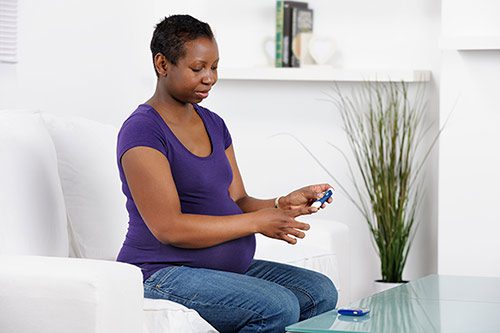 People living with an autoimmune disease may experience additional hardships throughout their pregnancy that are not frequently talked about, on top of already experiencing normal challenges. Within the United States, over seven percent of the population has been diagnosed with a form of an autoimmune disease.
People living with an autoimmune disease may experience additional hardships throughout their pregnancy that are not frequently talked about, on top of already experiencing normal challenges. Within the United States, over seven percent of the population has been diagnosed with a form of an autoimmune disease.
An autoimmune disease is a condition that causes the immune system to attack its own healthy cells, affecting numerous parts of the body. Since there are over 80 different discovered autoimmune diseases, a wide variety of symptoms may occur, making diagnosis difficult and symptom management stressful.
Autoimmune diseases are more common than we think, so it’s important to know about their symptoms whether you are diagnosed or not. The stress of pregnancy can lead to flare-ups in these conditions, so it’s best to be prepared to help yourself or anyone in your life who may be pregnant.
Keep reading to learn about the challenges of three different autoimmune diseases during pregnancy and how to minimize potential symptoms and complications to make pregnancy more comfortable.
Common Autoimmune Diseases
Psoriasis
Over 8 million people in the US suffer from psoriasis, making it quite a common autoimmune disease. Psoriasis is a chronic skin condition that causes inflammation to the skin and nails, leading to scaly, itchy, or painful patches on the skin. Flare-ups can be triggered by numerous instances such as high stress, sunburns or scratches to the skin, infections such as strep throat, and even poor eating habits.
The chronic skin condition goes through active and dormant periods, so those diagnosed with it may experience long periods of remission until they are affected by a trigger. Therefore, it’s important to pay attention to what may cause a flare-up and have a personal toolkit to help minimize symptoms when they arise.
Your toolkit can consist of remedies to make symptoms more bearable such as moisturizers for outbreaks, a skincare routine specifically for flare-ups, and activities that help you destress. Also, plan to contact your doctor for guidance and establish how to let your friends and family know that you may need some extra support during times of symptoms.
The good news is that most women who suffer from psoriasis often experience fewer flare-ups of the autoimmune disease than usual during pregnancy because of an increase in progesterone. This hormone helps override the immune system’s typical response to psoriasis triggers, making breakouts less likely to occur.
However, there is still a chance that psoriasis may worsen during pregnancy. Some women report that their condition gets much worse during pregnancy, likely due to increased stress and anxieties over childbirth. It’s not a guarantee that you will be in the clear, making it important to know how to handle the condition.
It’s important to speak with your doctor about how to best handle symptoms as some medications for psoriasis are not safe to take while pregnant because they may harm the baby. The best course of action is to rely on topical treatments such as clean ingredient moisturizers and avoid using coal tar and tazarotene.
Even though the chances of having long-term psoriasis outbreaks during pregnancy are less common, it’s vital to be prepared in case you are in the group of women who experience worsened symptoms. If this occurs, remember to immediately contact your doctor to create the best plan for you and your pregnancy.
Gestational Diabetes

Diabetes is an autoimmune disease in which the body cannot utilize the sugars and starches that are consumed from foods and turn them into energy. Insulin is used to break down these sugars. In the case of diabetes, the body either does not produce enough insulin or is insulin resistant, making it difficult to turn sugars and carbohydrates into energy.
Typically, women with gestational diabetes can maintain their blood sugar through a healthy diet and light exercise as directed by their doctor. However, this is easier said than done and does take some lifestyle adjustments if not used to having a generally healthy meal plan. Additionally, some women may need to take insulin to control their blood sugar if a healthy diet and exercise aren’t enough.
Complications of untreated gestational diabetes include:
C-section
A C-section, or cesarean section, can be a result of untreated diabetes during pregnancy. This operation is used to deliver the baby through the woman’s stomach and can lead to a longer recovery period after childbirth.
Large baby
Since a baby receives its nutrients from the woman carrying them, they too can have high blood sugar if they are receiving too much sugar. This can cause the fetus to grow extra-large and lead to complications during delivery, such as nerve damage to the shoulder for the baby because of excess pressure during delivery.
The expectant mother may experience great discomfort while carrying a large fetus, especially in the last trimester. It could lead to inducing labor prematurely if the baby is too large.
High Blood Pressure
Those with diabetes are more likely to have high blood pressure, which can cause health problems if not monitored closely. These complications can include the baby being born early and even the possibility of stroke or seizure during the delivery.
If you are diagnosed with gestational diabetes during pregnancy, it’s best to work with your doctor to create a plan to manage it. Be sure to get tested for diabetes after your baby is born in case it does not go away. In this case, you would likely be diagnosed with type 2 diabetes. While most women do not develop diabetes after pregnancy, it is still possible, so it’s important to maintain a healthy diet and exercise to limit the chances.
Lupus
Lupus is an autoimmune disease that causes inflammation in different organs of the body and 9 out of 10 cases in the US are diagnosed in women. Those living with lupus can experience full-term and healthy pregnancies, but they are still considered higher risk because they are more likely to experience complications.
Pregnancy with lupus is best when planned during times of remission. However, with unplanned pregnancies, this isn’t always possible. This means that pregnant women may experience more pain than usual in their organs affected by the autoimmune condition. If you have lupus and become pregnant during a period of symptoms, you can take steps to feel more comfortable.
For example, engage in healthy lifestyle habits such as eating lots of fruits and veggies and participating in physical activity that your doctor approves. You can also pay extra care to symptomatic areas that are in discomfort through gentle massages for relief. Some medications can harm the baby, so be sure to work with your doctor to review your medications and make any necessary changes.
Women with lupus are also at a higher risk of developing preeclampsia during pregnancy, which is a condition that only happens when pregnant. This condition can cause high blood pressure, protein in the urine, or water retention.
Keep in mind that every case of lupus is different, so it’s best to work with your physician to find how best to care for yourself. There is no cure-all for lupus, so keep self-care and self-love at the forefront of your pregnancy to keep your spirits high and mindset positive.
Preparing For Pregnancy With An Autoimmune Disorder
You can take actions to limit autoimmune disease symptoms or diagnosis during pregnancy. If you are already diagnosed with an autoimmune disease or are more prone to developing a condition, consider the following steps to set yourself up for a more successful and comfortable pregnancy.
Eat Healthily
A healthy diet can go a long way when it comes to autoimmune disease prevention and management during pregnancy. Diets high in anti-inflammatory properties and that include nutrient-rich foods are best for those looking to have a healthy pregnancy. Consider going plant-based for your pregnancy, or at least limiting processed foods that may have an impact on your overall health and energy.
Pregnancy can take a toll on your body and cause ample amounts of stress and exhaustion, so it’s important to give your body the fuel it needs as it prepares for birth. Consider making a list of go-to, easy-to-prepare foods for your pregnancy, so you don’t have to stress over what to eat when you feel a craving come on.
Stop Smoking
Smoking is one of the most common triggers in autoimmune diseases, whether pregnant or not. Consider quitting smoking to protect not only your health but also the health of your baby while pregnant.
Tobacco can lead to birth defects in the baby and lead to preterm labor. If you need help to stop smoking before or during pregnancy, don’t be afraid to seek support. This is not something you have to go through alone.
Daily Exercise
Exercise can help keep your health in check and aid your body in making sure everything is running properly not only during pregnancy but before and after too. Exercise releases endorphins, which is a feel-good chemical in the brain. This results in feeling happier and having a more positive attitude.
Exercise is important in preventing autoimmune triggers as stress can cause a flare-up or diagnosis. Care for your body by exercising each day to stay in tip-top shape and feel happier overall. Don’t forget to ask your doctor for the best exercise plan to determine what is safest for you and the baby.
Autoimmune Diseases and Pregnancy
Overall, having an autoimmune disease does not have to override your experience with pregnancy completely. Whether you are already diagnosed or are looking to prevent your chances, remember to put your health first and do what’s best for you. Work with your doctor to create a plan that is autoimmune friendly and includes a healthy diet, moderate exercise, and a medication review. With the right tools and mindset, you can have a great and comfortable pregnancy.
As Vice President of Lifetime Adoption, Heather Featherston holds an MBA and is passionate about working with those facing adoption, pregnancy, and parenting issues. Heather has conducted training for birth parent advocates, spoken to professional groups, and has appeared on television and radio to discuss the multiple aspects of adoption. She has provided one-on-one support to women and hopeful adoptive parents working through adoption decisions.
Since 2002, she has been helping pregnant women and others in crisis to learn more about adoption. Heather also trains and speaks nationwide to pregnancy clinics to effectively meet the needs of women who want to explore adoption for their child. Today, she continues to address the concerns women have about adoption and supports the needs of women who choose adoption for their child.
As a published author of the book Called to Adoption, Featherston loves to see God’s hand at work every day as she helps children and families come together through adoption.






0 Comments